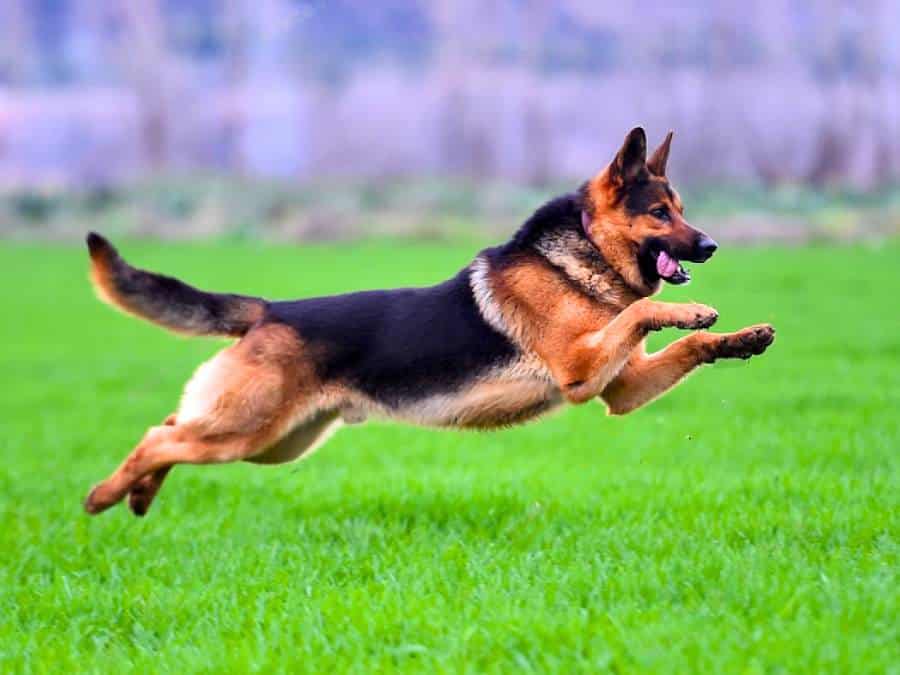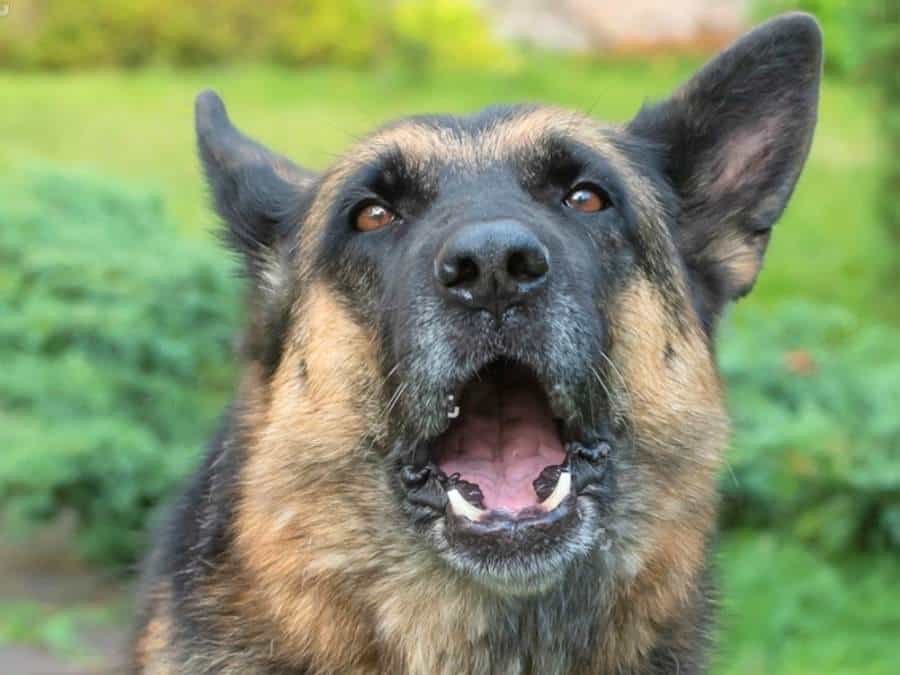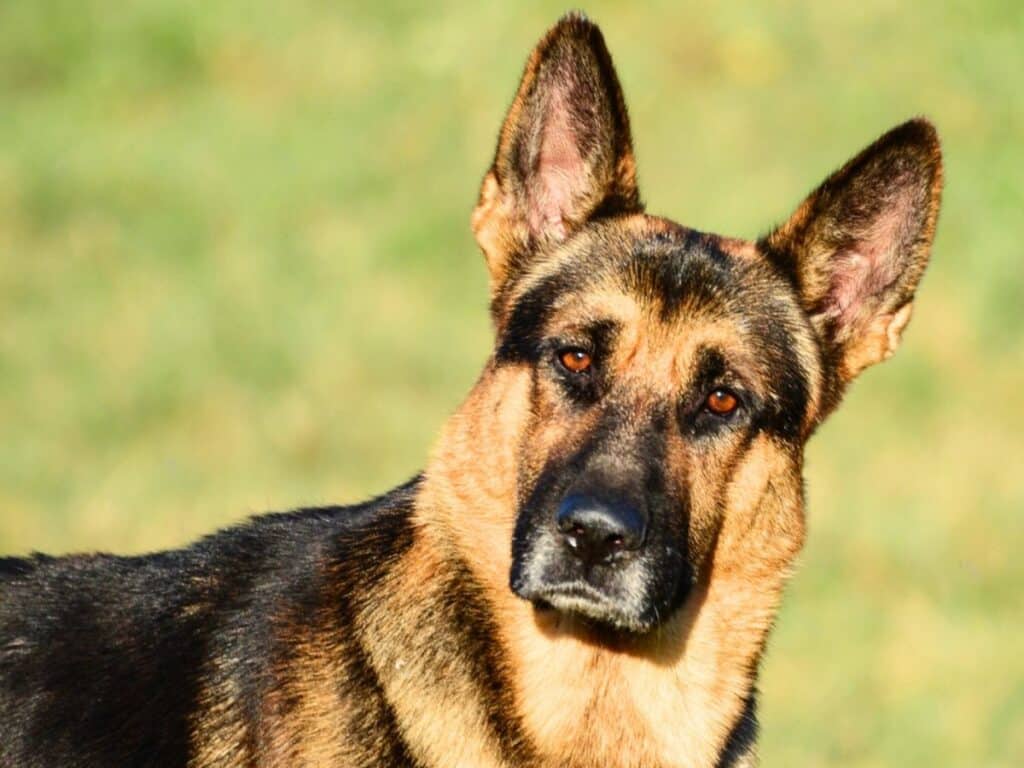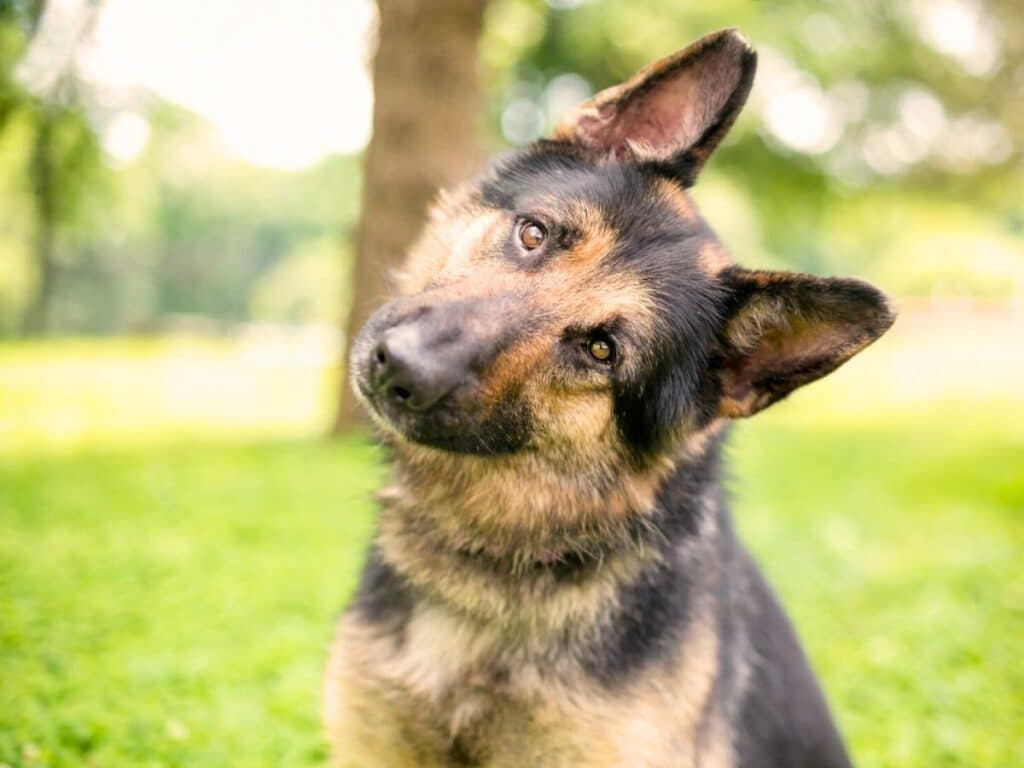German Shepherds are full of energy, whether they’re puppies or grown-ups. But if your dog is too hyper, don’t worry, there are ways to calm them down.
In this article, I will explain why your German Shepherd is hyper during the day or at night and what you can do to effectively channel your dog’s high energy levels.
Your German Shepherd’s hyper behavior does not have to become stressful for you or for anyone living within the household.
Why Is My German Shepherd So Hyper?
Your German Shepherd is so hyper simply because being hyper is in their genes. German Shepherds were bred as working dogs and their job was to run with their pack to herd and control other animals.
Your German Shepherd comes from a long line of descendants who were used to working in fields herding and protecting livestock, which required them to be highly energetic, agile, and alert.
In their working roles, German Shepherds were required to be on the move constantly. This demanded a high level of energy and endurance, contributing to the breed’s inherent hyperactive nature.
So your German Shepherd’s hyperactive behavior is simply a result of generations of selective breeding focusing on traits like agility, intelligence, and alertness, which are all useful traits for herding sheep and other animals.
Moreover, working-line German Shepherds may exhibit more hyperactive behavior compared to show-line dogs.
Also, male German Shepherds are typically 10-15% more energetic than their female counterparts.
RELATED: Male vs Female German Shepherd: Key Differences Between
Before we talk about ways to control your German Shepherd’s energy levels, let’s try to understand why these dogs often exhibit restless and hyperactive behavior.

Why Do German Shepherds Become Hyper
Genetics is not the only reason why German Shepherds tend to be hyper, especially when they become adults.
1. Lack of Exercise
German Shepherds who do not get to exercise every day do not know what to do with their pent-up energy, so they sometimes resort to expelling that energy through hyper behavior.
2, Lack of Mental Stimulation
In addition to physical exercise, German Shepherds need mental stimulation to keep them engaged. Interactive toys, training sessions, and puzzle games can help provide mental stimulation.
3. Boredom
If your German Shepherd is left alone with nothing to do, it may become bored and express this through hyperactivity. They will do whatever it takes to avoid boredom and experience excitement, even if that means running in circles, jumping on people, and vying for constant attention.
4. Lack of Attention
These dogs are reliant on companionship and do not do well when they are ignored. They require plenty of interaction and affection throughout the day. If you do not give them your attention often enough, your dog may react by getting hyper to attract the attention that they crave.
5. Age
Younger German Shepherds, especially puppies, tend to have high energy levels. As they mature, their energy levels may decrease, but proper training and exercise are still crucial.
RELATED: German Shepherd Behavior Stages By Age: Puppy To Senior Years
6. Hormonal Changes
If your German Shepherd is not spayed or neutered, hormonal changes can contribute to hyperactive behavior, especially in unaltered males.
Luckily, there are many things that you can do to keep your German Shepherd’s hyperactivity at bay throughout the day & at night.

10 Tips To Manage Your Dog’s Hyperactive Behavior
Dealing with a hyperactive German Shepherd can be challenging, but with patience, consistency, and proper training, you can help manage their behavior effectively. Here are ten tips to help you:
1. Regular Exercise: German Shepherds are high-energy dogs that require ample physical activity to stay balanced. Aim for at least 1-2 hours of exercise daily, which can include walks, runs, hikes, or play sessions in a fenced yard.
RELATED: How Much Exercise Does a German Shepherd Need? (Chart Included)
2. Mental Stimulation: Keep your German Shepherd’s mind engaged with interactive toys, puzzle feeders, obedience training sessions, or agility exercises. Mental stimulation is just as important as physical exercise in preventing boredom and hyperactivity.
3. Consistent Training: German Shepherds thrive on structure and routine. Invest time in obedience training to teach commands like sit, stay, and down. Use positive reinforcement techniques such as treats, praise, and play to reinforce desired behaviors.
4. Establish Boundaries: Set clear rules and boundaries for your German Shepherd to follow. Consistency is key in enforcing these boundaries, whether it’s regarding furniture access, meal times, or interactions with family members.
5. Socialization: Expose your German Shepherd to various people, animals, and environments from a young age to promote good social behavior and prevent anxiety-driven hyperactivity.
RELATED: How To Socialize Your German Shepherd: Checklist Included
6. Provide Outlets for Energy: Offer appropriate outlets for your dog’s natural instincts, such as fetch, tug-of-war, or agility training. Engage in activities that tap into their herding instincts, such as playing with a flirt pole or participating in herding trials.
7. Avoid Reinforcing Hyperactivity: Refrain from inadvertently reinforcing hyperactive behavior by giving attention or rewards when your dog is overly excitable. Instead, reward calm and relaxed behavior.
8. Consistent Routine: Establish a consistent daily routine for feeding, exercise, training, and rest. Dogs thrive on predictability, and a structured routine can help reduce anxiety and hyperactivity.
9. Avoid Overstimulation: Limit exposure to overly stimulating environments or situations that can trigger hyperactivity. Provide a quiet, calm space where your German Shepherd can relax and unwind.
10. Diet and Nutrition: Ensure your German Shepherd is receiving a balanced diet appropriate for their age, size, and activity level. A well-nourished dog is more likely to have balanced energy levels.
Managing hyperactive behavior takes time and consistency. Be patient with your dog and yourself as you work together to establish routines and reinforce positive behaviors.
If your German Shepherd’s hyperactivity persists despite your efforts, consider seeking guidance from a professional dog trainer or behaviorist. They can assess your dog’s behavior and provide personalized strategies for management.
RELATED: German Shepherd Herding Behavior

Why is My German Shepherd so Hyper at Night?
There are several reasons why your German Shepherd is active and hyper at night:
- Pent-up Energy: If your German Shepherd hasn’t had enough physical or mental stimulation during the day, they may become restless and hyperactive at night.
- Change in Routine: Dogs are creatures of habit, and any disruptions to their routine, such as changes in feeding times or exercise schedules, can lead to restlessness and hyperactivity, especially at night.
- Boredom: If your German Shepherd is left alone for long periods during the day without sufficient mental stimulation or companionship, they may become bored and restless at night, seeking attention or entertainment.
- Anxiety or Stress: Dogs can experience anxiety or stress for various reasons, including separation anxiety, loud noises, or changes in the environment. These feelings may manifest as hyperactivity, particularly when trying to cope with their emotions at night.
- Lack of Training: If your German Shepherd hasn’t been properly trained or conditioned to settle down at night, they may continue to exhibit hyperactive behavior.
To address your German Shepherd’s hyperactivity at night, consider incorporating more physical and mental exercise into their daily routine, maintaining a consistent schedule, providing interactive toys or puzzles for mental stimulation, and ensuring a comfortable and calming environment for sleep.
Supplements to Calm Your Hyper German Shepherd
Managing your German Shepherd’s stress and anxiety is essential for their well-being. Here are some products that can help you manage a hyperactive German Shepherd.
PetNC Natural Care Calming Aid Soft Chews

Petnc Calming Aid soft chews are formulated by veterinarians. These soft chews contain key ingredients like chamomile and l-tryptophan, known for their calming properties which can help your hyperactive German Shepherd become the calm, cool, and collected companion you love.
Buy PetNC Soft Chews on Amazon
Thundershirt Classic Dog Anxiety Jacket

The ThunderShirt dog jacket applies gentle, constant pressure to your dog’s body, mimicking the sensation of a comforting hug. This pressure has been shown to have a calming effect on dogs, helping to alleviate anxiety, fear, and over-excitement triggered by various environmental stimuli.
Buy Thundershirt Anxiety Jacket on Amazon

German Shepherd Energy Level by Age
The energy levels of German Shepherds can vary based on factors such as genetics, individual temperament, health, and environmental factors. However, here’s a general overview of German Shepherd energy levels by age:
1. Puppyhood (0-1 year):
- German Shepherd puppies are typically full of energy and curiosity.
- They have high energy levels and require frequent playtime, exercise, and mental stimulation.
- Puppies may have bursts of energy followed by periods of rest throughout the day.
2. Adolescence (1-2 years):
- Adolescent German Shepherds may have even higher energy levels than puppies.
- They are still growing and developing, which can contribute to their boundless energy.
- This stage requires consistent training, exercise, and mental stimulation to help channel their energy in productive ways.
3. Young Adult (2-5 years):
- During this stage, German Shepherds typically have peak energy levels.
- They are strong, active, and enthusiastic companions.
- Regular exercise, training, and engagement are essential to manage their energy and prevent boredom or behavioral issues.
4. Adult (5-9 years):
- As German Shepherds reach adulthood, their energy levels may start to stabilize.
- While they may not be as rambunctious as in their younger years, they still require daily exercise and mental stimulation to stay healthy and happy.
- Adult German Shepherds may enjoy activities such as jogging, hiking, or agility training to maintain their fitness and mental sharpness.
5. Senior (9+ years):
- Senior German Shepherds tend to have lower energy levels compared to their younger counterparts.
- They may prefer shorter and less intense activities but still benefit from gentle exercise to keep their muscles toned and joints mobile.
- As they age, it’s essential to monitor their health closely and adjust their exercise routine accordingly to accommodate any age-related changes or conditions.
It’s important to remember that individual German Shepherds may deviate from these general trends, and factors such as genetics, health, and lifestyle can influence their energy levels at any age.
RELATED: When Do German Shepherds Calm Down?

Frequently Asked Questions (FAQs)
Are German Shepherd puppies hyper?
Yes, German Shepherd puppies are typically quite energetic and can exhibit hyperactive behavior, especially during their early months of life.
As with many young dogs, their high energy levels are a natural part of their development and are fueled by their curiosity, playfulness, and growing physical capabilities. German Shepherd puppies often have bursts of energy followed by periods of rest throughout the day.
Is it normal for German Shepherds to be hyper?
Yes, according to this study, it is relatively common for German Shepherds to exhibit high energy levels and be prone to hyperactivity, especially when they are young. German Shepherds are a working breed originally bred for herding and guarding tasks, which require physical stamina, mental sharpness, and high levels of energy. As a result, they tend to be naturally active, alert, and energetic dogs.
Why are German Shepherds so hyper in the morning?
German Shepherds may be reacting to the changes in their environment as the day begins, such as increased activity in the household or the anticipation of breakfast and outdoor activities.
Additionally, German Shepherds are naturally active and alert dogs, and their energy levels tend to peak after a period of rest, such as overnight. This burst of energy is often a result of their inherent drive to be active and engaged.

At what age does a German Shepherd calm down?
German Shepherds typically start to calm down and mature around 2 to 3 years of age. During this time, they begin to settle into their adult temperament and personality. While individual variations exist, many German Shepherds experience a decrease in hyperactivity and a greater ability to focus as they reach adulthood.
Can German Shepherds be trained to be calm?
Yes, German Shepherds can be trained to be calm through consistent and positive reinforcement training techniques. Starting from a young age, it’s important to establish clear expectations and reward calm behavior with treats, praise, and attention.
Providing ample physical exercise and mental stimulation helps channel their energy in constructive ways, promoting relaxation and calmness.
How do I know if my German Shepherd has ADHD?
German Shepherds, like humans, can exhibit behaviors that may resemble Attention Deficit Hyperactivity Disorder (ADHD), but it’s important to note that ADHD is a human-specific diagnosis. However, if you notice excessive hyperactivity, impulsivity, and difficulty focusing in your German Shepherd, it could be indicative of underlying issues that need to be addressed.
Signs of hyperactivity in German Shepherds may include constant pacing, inability to settle, excessive barking, and destructive behavior.
Additionally, if your dog struggles to pay attention, frequently interrupts activities, or exhibits impulsive behavior, it may be worth consulting with a veterinarian or professional dog behaviorist to rule out any medical conditions or behavioral issues and develop a tailored management plan.
Final Remarks
In conclusion, understanding why German Shepherds can be hyperactive is essential for responsible pet ownership. Factors such as genetics, age, temperament, environment, and lifestyle all play a role in determining a dog’s energy levels and behavior.
By providing a structured routine, positive reinforcement training, and outlets for physical and mental stimulation, pet parents can help their German Shepherds lead balanced and fulfilling lives. Additionally, consulting with a veterinarian or professional dog trainer can offer valuable insights and guidance for addressing hyperactivity in German Shepherds effectively.




